Honda Mobilio diesel vs Maruti Ertiga comparison
The Mobilio is Honda's first MPV for India. But how does it fare against the popular Maruti Ertiga? We pit the diesel variants against each other.
Published On Jul 10, 2014 03:45:00 AM
4,53,639 Views
Follow us on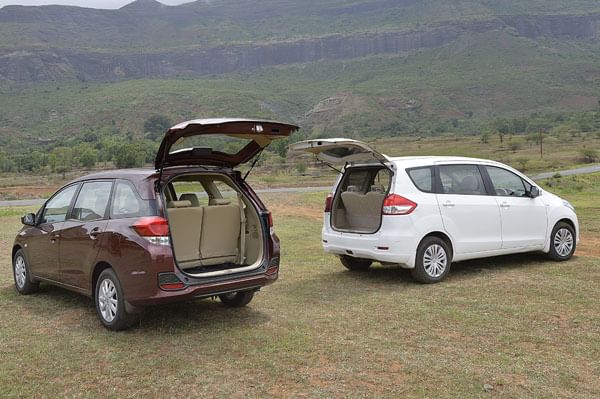
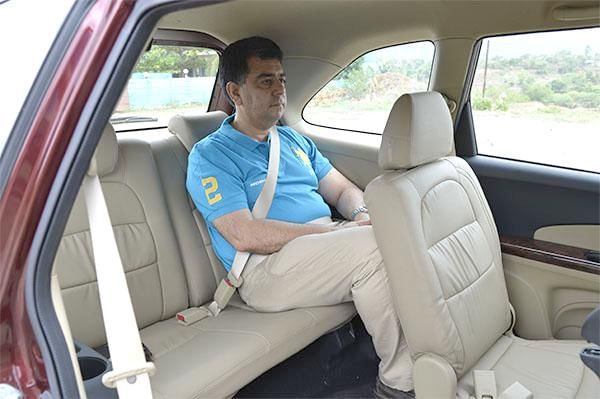
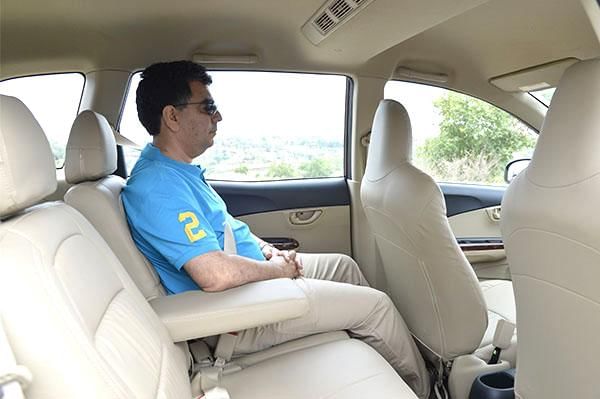
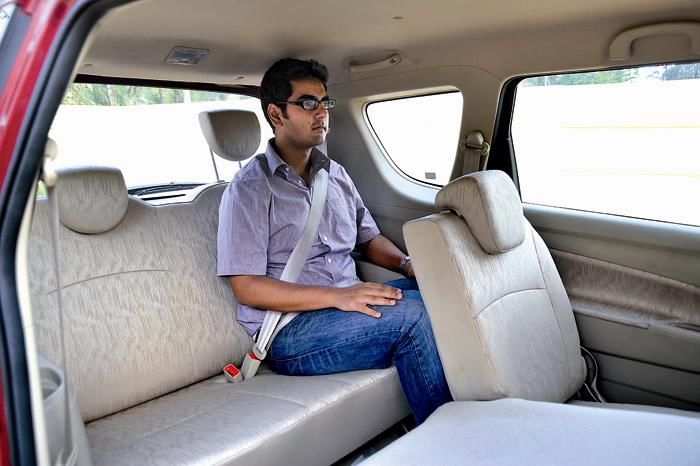
![]() By Staff Writer
By Staff Writer
Honda's new seven-seater, the Mobilio, has been getting a lot of attention of late. It’s attractive to look at, very practical, and powered by a set of accomplished engines. Question is, is it a better car than Maruti's already successful seven seater, the Ertiga? The Maruti MPV is very similar in concept to the Honda and it’s the best-selling car of its kind today. Can Honda end the Ertiga’s reign at the top? That’s the big MPV question we are about to answer.
Visual Appeal
The Ertiga is easily identifiable as a product from Maruti's stable. The front styling is reminiscent of the Swift and Ritz hatchbacks, with similarly styled swept-back headlamps, grille and bonnet. However, the rear-end design is quite van-like, and though the overall design is pleasing, it’s rather bland.
The Mobillio looks anything but boring. Move away from the Brio-like front (a chrome bar and new sporty bumper attempt some visual differentiation) and the looks keep getting better. The sides, with the kinks in the window line and the ‘floating’ D pillar, give it a racy look, but it’s the rear that looks best, thanks to superb tail-lights and a smartly designed tailgate.
Inside story
The Ertiga's big doors open wide, which makes it easy for occupants to get in and out. However, the middle row seat only slides forward and doesn’t tumble down like in the Mobilio. This makes accessing the third row terribly inconvenient, but once you get inside, the last bench is, surprisingly, more comfortable than Mobilio’s. The Mobilio has a lot more knee room than the Ertiga, but that’s not a deal breaker, because with some clever adjustment of the middle seat, you can liberate enough space for your legs in the Maruti. Where the Ertiga trumps the Mobilio is with the seat height in the third row. In the Ertiga you have a nice upright seating position and good under thigh support, but in the Mobilio you sit really low with your knees pointing to the roof, which seriously compromises comfort.
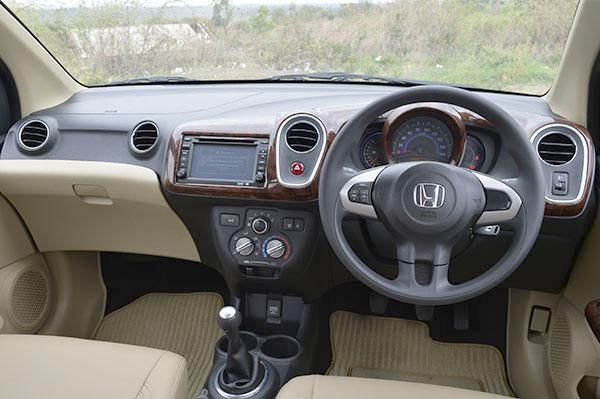
In fact, the big surprise is that all the Ertiga’s seats feel more comfortable, period. The soft cushions and generous thigh suport cosset you better, and the Mobilio’s seats just don’t feel as plush in comparison.
The Ertiga continues to score with a dashboard that looks more upmarket than the Mobilio’s patchy fascia, which now gets a garish and unconvincing mock wood trim treatment. Let’s not forget that the starting point for the Mobilio is essentially Honda’s entry-level hatchback, the Brio, whilst the Ertiga uses the platform of the Swift, which is a segment higher than the Brio. As a result, it uses components like the instrument cluster and bits of the centre console from the Swift and Dzire, which look more upmarket.
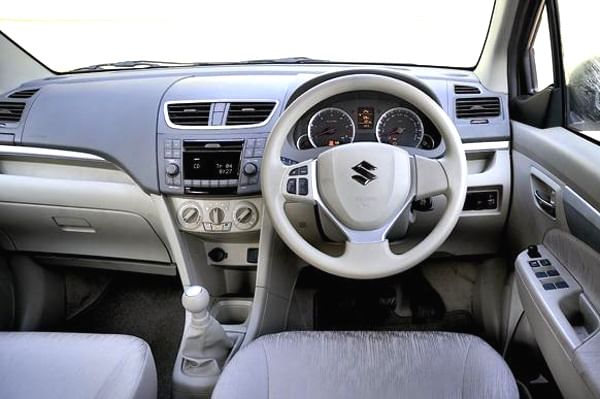
Where the Mobilio comprehensively trumps the Ertiga is with storage space. Not only does it have larger bins and cubbyholes in the cabin, but the luggage area is far bigger too. It’s brilliantly designed too, able to take a couple of not-so-small bags, and a low loading lip makes the job easy. If you have to regularly travel with a full house and luggage, the Mobilio makes more sense.
How do they drive?
The Maruti Ertiga’s diesel motor is the tried-and-tested 1.3-litre, Fiat-sourced turbo-diesel that also powers the Maruti SX4, and a host of Tata and (of course) Fiat products. It produces max power of 88.7bhp and 20.39kgm of torque, and is mated to a five-speed manual transmission. On paper, it seems adequate enough, and for the most part it is. There’s a nice spring in the mid-range that makes overtaking quite easy, and the Ertiga can cruise cross country quite effortlessly. It’s when you have to potter around town or tackle hills that one of the Ertiga’s weakest links is exposed – the lack of engine response at low revs. In fact, with a full load, going uphill, you have to slam the smooth shifting gearbox into first gear pretty often to get the engine spinning above 2,000rpm. Below this point, this engine feels pretty gutless.
In the Mobilio, the 1498cc, four-cylinder i-DTEC engine that generates 98.6bhp and 20.4kgm of torque is the Honda MPV’s ace card. It is mated to the Amaze’s five-speed 'box (and not the City’s six-speeder), but it makes driving pretty effortless. What’s amazing is the wide torque spread, which means there’s enough poke to pull from 1,500rpm to the modest 4,500rpm redline in any gear.
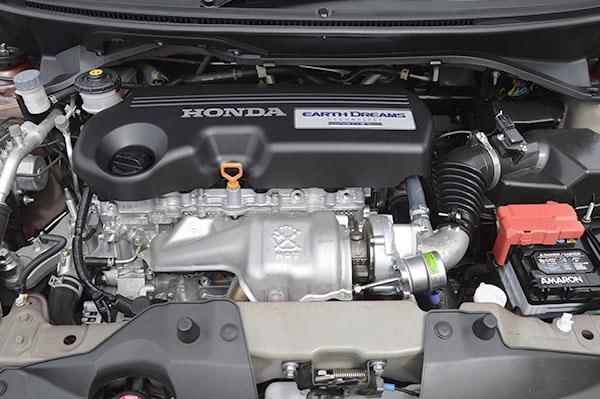
If there is a weakness, it’s the noise levels. Honda’s all-aluminium diesel motor earned a reputation for making a racket in the Amaze, and Honda has quickly reacted to that feedback. The same motor sits in the City, where It’s less noisy, and in the Mobilio too where it has been further muted. Though the engine still isn’t as hushed as the competition (Ertiga included), the noise levels are acceptable, rather than intrusive.
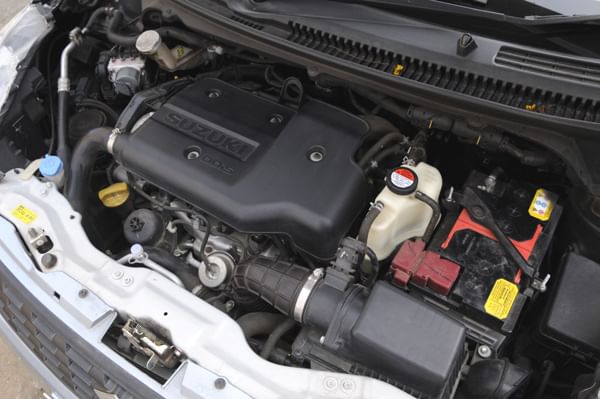
The Ertiga further enhances its level of comfort with a ride quality that is pliant and well-rounded. It doesn’t feel harsh, and at moderate speeds will keep passengers happy. It rolls a bit more than the Mobilio around corners, but its meatier steering feel, which gives you confidence, makes up for any waywardness at high speed. The Mobilio seems better tied down, especially the rear, which feels rock steady at all times. In fact, the well planted rear suspension makes the front of the car feel a little light in comparison; the steering, which has a dead zone around the straight ahead position, contributes to this feeling. Overall, the Mobilio has a firm edge to its suspension, which comes into its own when pelting down a rough road at a good clip. This MPV feels remarkably stable.
Which one?
The Ertiga may be a bit too dull to look at on the outside in comparison to the Mobilio, but when you step inside, it’s the Maruti which feels more premium with its well-built and upmarket looking dashboard. Though the Ertiga has a smaller cabin, the comfortable seats and cushier ride give it an edge when it comes to overall comfort. By deftly adjusting the seats, there’s enough room for seven people, but that’s only if your family and friends are of average build. Even the odd tall person may find the interiors cramped, as the leg and knee room can be limited if seven passengers are to be accomodated.
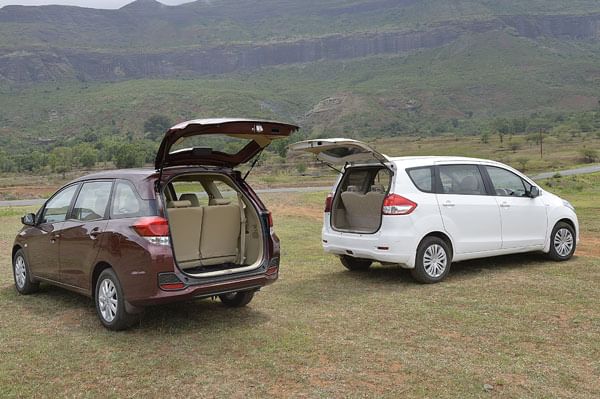
The Ertiga’s 1.3-litre diesel feels laboured at low revs and, as result, the Maruti MPV isn’t as effortless to drive as the Mobilio, which feels like it has a surplus of grunt in comparison. It feels like a bigger car with an airier cabin, a more authoritative ride and far better road presence. In fact, unlike the Ertiga, which is essentially a people carrier, the Mobilio has the image to pass muster as a family car too.
Honda Mobilio Petrol V: Rs 8.76 lakh
Honda Mobilio Diesel V: Rs 10.31 lakh
Honda Mobilio Diesel RS: Rs 11.48 lakh
Honda Mobilio Petrol V: Rs 9.28 lakh
Honda Mobilio Diesel V: Rs 9.76 lakh
Honda Mobilio Diesel RS: Rs 10.86 lakh
Specifications comparison:
Honda Mobilio vs Maruti Ertiga vs Toyota Innova
Copyright (c) Autocar India. All rights reserved.


Comments
Member Login
Personal Details
No comments yet. Be the first to comment.